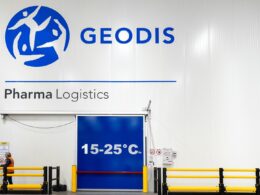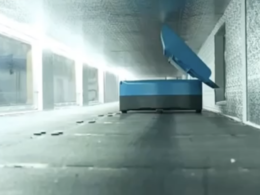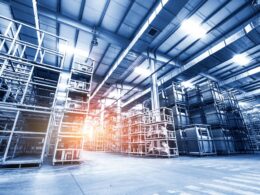Sales of autonomous mobile robots and driverless lift trucks are taking off but the game-changing intralogistics technologies we will see at IMHX 2022 go much further than the simple replacement of man by machine, says event director, Rob Fisher.
Across the intralogistics sector sales of autonomous mobile robots (AMRs) are booming. Indeed, in a recent report Interact Analysis forecast that more than 1.1 million robots will be deployed in warehouses around the world before the end of 2024. And almost a fifth of respondents quizzed earlier this year for the IMHX Optimism Index expected to be using AMRs to some extent within the next 12 months – a remarkably high figure for a technology that was seen as futuristic just a few years ago.
In simple terms, AMR technology differs from the science behind long-established Automated Guided Vehicles (AGVs) in that the units do not rely on human interaction to change route. Instead, on-board navigation systems guide them between destinations.
These robots are proving a particularly effective alternative to the type of conveyor-based sortation systems that have historically been used at parcel hubs and order fulfilment centres. Their attraction is partly based on the fact that they require a significantly smaller floor area within which to operate than a conveyor to achieve the same parcel throughput statistics – at a time when every square foot of available floorspace has to be optimised, this particular benefit is clearly a significant plus point.
Modular AMR-based sortation systems are also scalable, so additional robots can be introduced as and when they are needed to cope with any spikes in throughput and, what’s more, if an individual robot malfunctions, it is simply and quickly removed from the ‘shop floor’ and replaced with no discernible drop in throughput capacity.
The technology is also fully portable, which allows systems to be switched between sites if required.
Until now China and the USA have been the top two investors in AMR sortation systems but, as autonomous mobile robot technology’s reputation for bringing flexibility and scalability to some of the busiest parcel sorting hubs in the world spreads, Europe’s logistics community is increasingly conscious of the benefits that this innovative, low CapEx approach brings.
Of course, other forms of robotic and automated intralogistics technology are taking off too. For example, with a substantial decline in the availability of forklift drivers recognised as a major problem, a growing number of warehouse and distribution centre operators see driverless forklift truck technology as the solution to the recruitment and employment cost challenges they face.
Driverless forklifts undertake every type of task that would be expected of a manually-operated forklift – including vehicle loading and unloading, pallet put-away and retrieval in both standard and very narrow aisle racking configurations, as well as pallet and stillage movements throughout the warehouse.
In addition to the obvious savings in labour costs that driverless forklifts bring, other benefits include: reduced damage to goods, racking and trucks; greater picking accuracy; and more efficient use of the available storage space.
DHL and Walmart are among the high profile businesses to have already adopted driverless lift trucks, while countless small and medium sized forklift users are also benefiting from the advantages that the technology delivers.
But the developments and technologies we will see at IMHX 2022 will go much further than the simple replacement of man by machine.
Artificial Intelligence, machine learning, ‘big data’ and the Internet of Things are beginning to be adopted in a significant way right across the logistics field to allow warehouses or distribution centres to become self-learning, self-correcting, self-optimising operations capable of adapting to change in real time.
And as technology continues to play an ever-more crucial role in shaping the future of supply chains, IMHX 2022 will provide a fascinating opportunity to discover artificial intelligence, robotics, and automated handling systems by bringing together world-class suppliers of intralogistics and supply chain solutions across three days of interactive demonstrations, exciting new product announcements and immersive experiences.
In addition to the full exhibition floor, which includes names such as Whittan Group, Knapp, Combilift, Geekplus, Cesab, Zebra Technologies and Swisslog, IMHX 2022 will also host a multi-track series of educational seminars, talks and workshops. Covering key industry themes and trends, the line up of influencers, innovators and pioneers among the conference speakers will reflect the growing role of artificial intelligence, automation and robotics within the modern supply chain.
The seminars are free to attend and alongside the innovations on show within the main exhibition halls they make a day at IMHX 2022 an outstanding opportunity for logistics industry professionals to stay ahead of the shifting landscape of supply chain processes.
IMHX 2022 takes place from 6 – 8 September at the NEC, Birmingham. To find out more and activate your free pass, please visit imhx.net.













